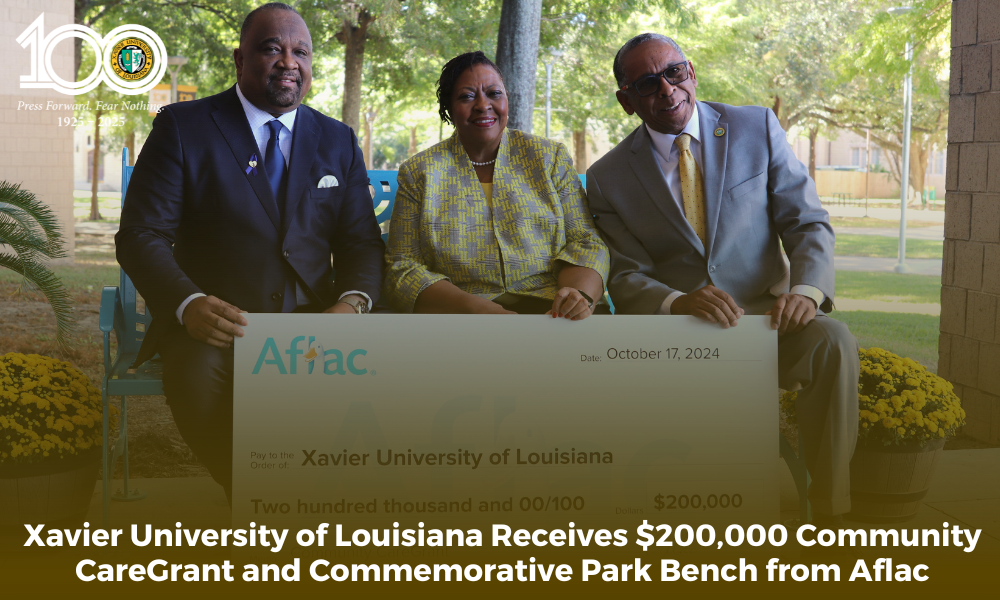
Xavier University of Louisiana was built on a foundation of educating those from underrepresented communities. Since its inception, the university has catered to those from diverse backgrounds, especially when higher education was generally inaccessible to minority communities. Now approaching a historic centennial, celebrating its last 100 years of service and looking forward to 100 more, Xavier University of Louisiana is adding a program to its roster that will help illustrate the cultural conditions that led to its establishment with the launch of its African American and African Diasporic Cultural Studies Program (AAADCS). The new program will carry the name of the current minor, African American Diaspora Studies (AADS).
"Xavier has always embraced diversity and inclusivity as core values and is committed to expanding programs that create more opportunities for Xavierites,” said Dr. Marguerite Giguette, Interim Provost and Senior Vice President of Academic Affairs. “The AADS program has an interdisciplinary approach that builds historical and cultural knowledge for program students and allows them the chance to gain experience and receive an education preparing them to be of service to global society."
The AADS Program is a new major offered at Xavier University starting spring of 2024. However, a “soft launch” of the program in August made select courses available to students during the fall 2023 semester. Spearheaded by Dr. Sharlene Sinegal-Decuir (‘99), the former head of the history department and a Xavier alumna, the program will provide students with a comprehensive understanding of the African American Diasporic experience in a global world, allowing Xavierites to learn and understand the development of social, political and economic structures of several countries. Funded through a grant by the Andrew W. Mellon Foundation, the largest supporting grant program of the arts and humanities in the United States, the new program will help students understand historical and cultural shifts in the Black experience and teach the necessary facts about a history that is essentially their own.
“Today, it is evident that students are not receiving knowledge [about Black history] as school systems tend to remove the African American Diasporic experience from history and learning. Students are entering HBCUs (Historically Black Colleges and Universities) with little to no knowledge of the value and contributions of the diaspora,” said Dr. Sinegal-DeCuir, who is also the current president of Xavier’s Faculty Association and the inaugural chair of the new AADS major. “This does a real disservice to us [Black people]. Our youth doesn’t know our history. I remember being a student at Xavier back in the 90s and taking some African American Diasporic minor courses, I was blown away by the fact that I did not know anything about our history. Taking those minor courses fueled my desire to learn more about my history. After teaching African American History for 15 years at Xavier I clearly saw the need to expand the AADS minor into a major. Our students are eager to learn more about their history!”
The new program overcame a challenging start. The grant to fund the program was awarded in 2020, but the COVID-19 pandemic halted its implementation. During that time, however, Dr. Sinegal-DeCuir was able to establish the necessary areas for the program and the interdisciplinary approach that it will have. When the program officially begins as a major in 2024, it will highlight four distinct areas: New Social Justice Movements, Black Health Disparities, Decolonial Studies, and Transatlantic Blackness. The 120-credit hour program will help the already predominantly Black population of students at Xavier learn more about their own history and culture but in a flexible way that allows them to also pursue other fields of study.
“I created the major with flexibility so that a student could easily double-major in AADS and another subject. i,” said Dr. Sinegal-DeCuir, “I know here at Xavier, parents send their kids to major in STEM. The AADS major essentially allows a student the flexibility to do both, they can satisfy their parents and themselves, it is the best of both worlds.”
The beginning of the AADS major comes at a tumultuous time for the studies of African American contributions to our society, according to Dr. Sinegal-DeCuir. With other states, notably Florida and Texas, challenging educational standards in a way that excludes information about the history of African Americans in the United States, Dr. Sinegal-DeCuir says that the establishment of this program, especially at an HBCU like Xavier, is more pertinent than ever. In the wake of the Supreme Court’s decision to end Affirmative Action, HBCUs will play a more vital role in educating and expanding access to knowledge to students from underrepresented communities. Programs such as the AADS major program can shape the understanding these students have.
“There is a need for [this] major right now because of the laws that are being passed that bans [the teaching of] African American history,” said Dr. Sinegal-DeCuir. “This program is extremely important. In states where education is supported by state dollars, their governors have a right to make any concessions to education. You see all across [the nation, but] mainly in the Deep South...any programs that implement Black studies or African American studies in those state schools are in jeopardy.”
This sentiment is shared by some of the new professors hired to help Dr. Sinegal-DeCuir run the program. Dr. Tarik Richardson, who earned a Ph.D. in Africology from Temple University, also expressed how important it is for universities like Xavier to have a major that will create a space for Black culture and history.
“I think that it is incredibly important and valuable for a university like Xavier to be home to a culturally grounded department like the one we are trying to create,” said Dr. Richardson. “As an HBCU, we have created a space that values our Black students; as a department, we are working to create a space to value Black ideas, perspectives, philosophies, experiences, and cultures. As an Africologist, I believe it is our responsibility as a department to train our students to become the next generation of scholars to change the paradigm of Black Studies.”
Along with Dr. Richardson, Xavier hired three other new professors for the program: Dr. Camille Dantzler, who attended Howard for her Ph.D. in African American Studies; Dr. Cassandra Shepard, who received a Ph.D. in African American history from Northwestern University; and Dr. Rasheed Atwater, who holds a Ph.D. in Africology from Temple University. They will act as professors and advisors alongside Dr. Sinegal-DeCuir for the students who will participate in the program. The new faculty have already begun teaching courses in the African American Diasporic minor that the university already has. Applicants or current students who wish to double-major can officially start classes for the major in Spring 2024.
For Dr. Sinegal-DeCuir, the need for this program as a major instead of just a minor cannot be overstated. In a time when Black history in education is being challenged and erased, having a foundational knowledge of the country and the African American experience in it is not only beneficial but essential.
“The African American experience is a part of the American experience, and if you’re teaching it in a way where you are teaching the facts, then the facts are going to speak for themselves, the facts will allow our students to make connections between the past and our future. We have to learn our history to understand our strength and know our worth,” said Dr. Sinegal-DeCuir. “This is why a program like this, at an HBCU, is needed.”



